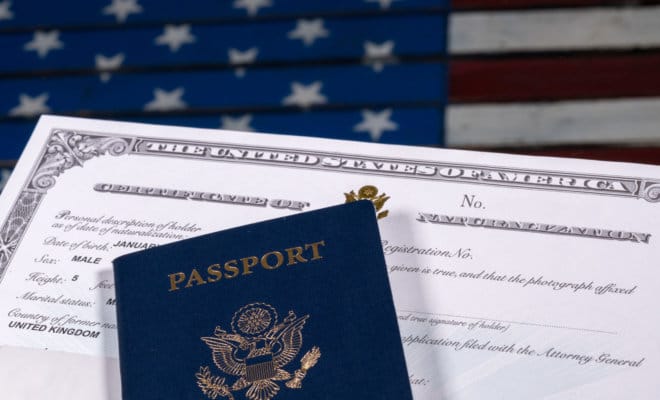Immigration
California Sues Over U.S. Decision to Add Citizenship Question in Census

USA passport and Naturalization Certificate of citizenship.
Photo: Bigstock
The move by U.S Commerce Department invites backlash as critics say it could discourage participation from immigrants who fear how the information would be used against them.
California, which has a large percentage of immigrant population, filed a lawsuit in federal court on March 27 against the U.S. Commerce Department and Census Bureau over the decision to reinstate the citizenship question in the 2020 decennial Census. The decision aims to help enforce the Voting Rights Act, the Commerce Department said on March 26, prompting California Attorney General Xavier Becerra to announce the lawsuit against the Trump administration in a bid to block the move.
The U.S Census Bureau currently counts the total number of people in the country every 10 years, not the citizens. The Census count is used to redraw congressional districts so it can affect the makeup of Congress.
The Census survey before 1950 asked citizenship questions consistently, the department said, adding that the recent decision was prompted by a request from the Department of Justice in December last year, as census block level citizenship voting age population (CVAP) data is not currently available from government surveys. The DOJ and the courts use CVAP data for the enforcement of Section 2 of the Voting Rights Act, which looks into minority voting rights, the statement said.
The move invited immediate backlash from Congressional lawmakers, mayors and civil rights activists, who said that the move was designed to undercount immigrants and minorities, the USA Today reported.
“This is not the time to parachute in and try to throw something in at the last minute, particularly something so incendiary that is likely to impact people’s willingness to participate,” Terry Ao Minnis, the director of Census and Voting Programs at Asian Americans Advancing Justice, was quoted as saying by the publication.
Democratic Representative Grace Meng of New York said she “will now look to introduce legislation to stop this question from being included on the census,” according to NPR.
Vanita Gupta, the president and CEO of the Leadership Conference on Civil and Human Rights, on March 26 said: “This untimely, unnecessary, and untested citizenship question will disrupt planning at a critical point, undermine years of painstaking preparation, and increase costs significantly, putting a successful, accurate count at risk.
“The question is unnecessarily intrusive and will raise concerns in all households – native- and foreign-born, citizen and non-citizen – about the confidentiality of information provided to the government and how government authorities may use that information.”
In response to the Justice Department’s request, a group of senators sent a letter to Acting Assistant Attorney General John Gore on March 15 asking about the involvement of the White House, and other entities, including himself, in adding the citizenship question. They asked Gore to respond to all of their questions by March 26, given the fact that the U.S. Census Bureau has to submit their questions to the U.S. Congress by March 31.
In the eight-page memo released by the department, Commerce Secretary Wilbur Ross rejected claims that citizenship questions, which he is looking to place last, have an impact on the Census. Ross said that the Voting Rights Act needs to have a tally of citizens of voting age to protect minorities against discrimination.
He said: “The reinstatement of a citizenship question will not decrease the response rate of residents who already decided not to respond. And no one provided evidence that there are residents who would respond accurately to a decennial census that did not contain a citizenship question but would not respond if it did (although many believed that such residents had to exist).”
When he conceded the possibility of it, he said, “There is no information available to determine the number of people who would in fact not respond due to a citizenship question being added, and no one has identified any mechanism for making such a determination.”



